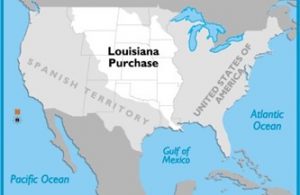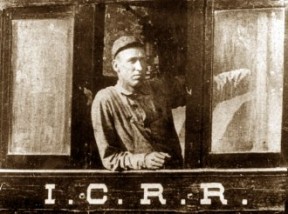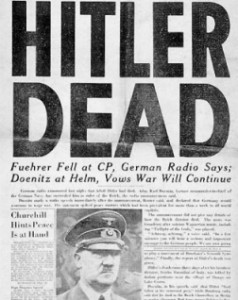Daily History Lesson … April 30
“Historical investigation has for its aim to fix the order and character of events throughout past time and in all places. Those who cannot remember the past are condemned to repeat it.”
~George Santayana
1789 – George Washington was inaugurated as the first president of the United States. The inaugural ceremony was performed on the balcony of Federal Hall on Wall Street, and a large crowd cheered after he took the oath of office. The president then retired indoors to read Congress his inaugural address, a quiet speech in which he spoke of “the experiment entrusted to the hands of the American people.” The evening celebration was opened and closed by 13 skyrockets and 13 cannons.

1803 – Representatives of the United States and France concluded negotiations for the Louisiana Purchase, a massive land sale that doubled the size of the young American republic.
The United States agreed to pay $11,250,000 and assumed claims of its citizens against France in the amount of $3,750,000. In exchange, the United States acquired the vast domain of Louisiana Territory, some 828,000 square miles of land which comprised most of modern-day United States between the Mississippi and the Rocky Mountains, with the exceptions of Texas, parts of New Mexico, and other pockets of land already controlled by the United States.
In October, Congress ratified the purchase, and in December 1803 France formally transferred authority over the region to the United States. The acquisition of the Louisiana Territory for the bargain price of less than three cents an acre was Thomas Jefferson’s most notable achievement as president.

1900 – Jonathan Luther “Casey” Jones was killed when his passenger train, the Cannonball Express, collided with a stalled freight train at Vaughan, Mississippi. The train had left from the Poplar Street Station in downtown Memphis, Tennessee on its way to Canton, Mississippi. The Cannonball Express was running at about 75 miles per hour toward Vaughan, and traveling through a 1.5-mile left-hand curve that blocked Jones’ view.
Once he rounded the bend, Jones spotted the stalled train, reversed the throttle and slammed the airbrakes into emergency stop, but “Ole 382” quickly plowed through a wooden caboose, a car load of hay, another of corn, and half way through a car of timber before leaving the track. He had reduced his speed from about 75 miles per hour to about 35 miles per hour when he hit. He was the only one killed in the wreck, but his quick thinking saved the lives of passengers from serious injury or death.

1945 – Holed up in a bunker under his headquarters in Berlin, Adolf Hitler committed suicide by shooting himself in the head.
By July 1944, several German military commanders had acknowledged their imminent defeat and plotted to remove Hitler from power so as to negotiate a more favorable peace. Their attempts to assassinate Hitler failed, however, and in his reprisals, he executed over 4,000 fellow countrymen.
In January 1945, facing a siege of Berlin by the Soviets, Hitler withdrew to his bunker to live out his final days. Located 55 feet under the chancellery, the shelter contained 18 rooms and was fully self-sufficient, with its own water and electrical supply. Though he was facing imminent defeat, Hitler continued to give orders and meet with close subordinates such as Hermann Goering and Josef Goebbels. He married his long-time mistress Eva Braun just one day before their joint suicides.
In his last will and testament, Hitler appointed Admiral Karl Donitz as Reich President and Goebbels as chancellor. He then retired to his private quarters with Braun, where they took their own lives; Braun by way of a cyanide capsule and Hitler by shooting himself with his service pistol.
Only eight days later, on May 8, 1945, the German forces issued an unconditional surrender, ending Hitler’s dreams of a “1,000-year” Reich, leaving Germany to be carved up by the four Allied powers.
1973 – President Richard Nixon announced the “resignations” of White House Chief of Staff H.R. Haldeman, Chief Domestic Advisor John Erlichman, and Attorney General Richard Kleindienst. The president also fired White House Counsel John Dean.

1975 – In Saigon, South Vietnamese President Nguyen Van Thieu had resigned and transferred authority to Vice President Tran Van Huong before fleeing the city. That had no effect on the inevitable. The North Vietnamese had completely encircled Saigon.
Despite previous presidential promises to provide aid in such a scenario, the United States did nothing. By this time, Richard Nixon had resigned from office and his successor, Gerald Ford, was unable to convince a hostile Congress to make good on Nixon’s earlier promises to rescue Saigon from communist takeover.
And so on this date, when North Vietnamese tanks crashed through the gates of the Presidential Palace at dawn, they met little resistance. North Vietnamese Col. Bui Tin accepted the surrender from Gen. Duong Van Minh, who had taken over after Tran Van Huong spent only one day in power. The Vietnam War was finally over.

1993 – Women’s tennis player Monica Seles was stabbed by Gunter Parche, a deranged German man during a match in Hamburg. The assailant, a fan of German tennis star Steffi Graf, hoped that by injuring Seles his idol Graf would be able to regain her Number 1 ranking.
Parche, who was described as a mentally unbalanced loner, contended he was only trying to hurt Seles, not kill her. A German court convicted him of grievous bodily harm in October 1993 and he received a two-year suspended sentence.
Compiled by Ray Lemire ©2017 RayLemire.com. / Streamingoldies.com. All Rights Reserved.